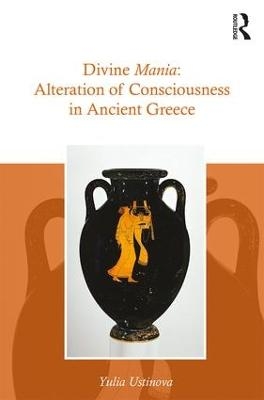
Divine Mania
Alteration of Consciousness in Ancient Greece
Seiten
2017
Routledge (Verlag)
978-1-138-29811-8 (ISBN)
Routledge (Verlag)
978-1-138-29811-8 (ISBN)
‘Our greatest blessings come to us by way of mania, provided it is given us by divine gift,’ – says Socrates in Plato’s Phaedrus. Certain forms of alteration of consciousness, considered to be inspired by supernatural forces, were actively sought in ancient Greece. Divine mania comprises a fascinating array of diverse experiences: numerous initiates underwent some kind of alteration of consciousness during mystery rites; sacred officials and inquirers attained revelations in major oracular centres; possession states were actively sought; finally, some thinkers, such as Pythagoras and Socrates, probably practiced manipulation of consciousness. These experiences, which could be voluntary or involuntary, intense or mild, were interpreted as an invasive divine power within one’s mind, or illumination granted by a super-human being.
Greece was unique in its attitude to alteration of consciousness. From the perspective of individual and public freedom, the prominent position of the divine mania in Greek society reflects its acceptance of the inborn human proclivity to experience alteration of consciousness, interpreted in positive terms as god-sent. These mental states were treated with cautious respect, and in contrast to the majority of complex societies, ancient and modern, were never suppressed or pushed to the cultural and social periphery.
Greece was unique in its attitude to alteration of consciousness. From the perspective of individual and public freedom, the prominent position of the divine mania in Greek society reflects its acceptance of the inborn human proclivity to experience alteration of consciousness, interpreted in positive terms as god-sent. These mental states were treated with cautious respect, and in contrast to the majority of complex societies, ancient and modern, were never suppressed or pushed to the cultural and social periphery.
Yulia Ustinova is the Anna and Sam Lopin Professor of History at Ben-Gurion University of Negev, Israel. Her main field of study is ancient Greek religion and its role within the society. In addition to historical written and archaeological sources, she makes use of a multidisciplinary approach based on the application of results of cognitive neuroscience, anthropology, and sociology to the interpretation of historical phenomena.
Introduction 1. Prophetic mania 2. Telestic mania and near-death experiences 3. Bakcheia 4. Mania on the battlefield and on the march 5. Nympholepsy 6. Poetic mania 7. Erotic mania 8. The philosopher’s mania and his path to truth Epilogue: Perspectives on divine mania
| Erscheinungsdatum | 22.11.2017 |
|---|---|
| Verlagsort | London |
| Sprache | englisch |
| Maße | 156 x 234 mm |
| Gewicht | 657 g |
| Themenwelt | Geschichte ► Allgemeine Geschichte ► Altertum / Antike |
| Geisteswissenschaften ► Philosophie ► Philosophie Altertum / Antike | |
| Geisteswissenschaften ► Psychologie ► Allgemeine Psychologie | |
| Geisteswissenschaften ► Religion / Theologie | |
| Studium ► Querschnittsbereiche ► Geschichte / Ethik der Medizin | |
| Sozialwissenschaften ► Soziologie | |
| ISBN-10 | 1-138-29811-5 / 1138298115 |
| ISBN-13 | 978-1-138-29811-8 / 9781138298118 |
| Zustand | Neuware |
| Haben Sie eine Frage zum Produkt? |
Mehr entdecken
aus dem Bereich
aus dem Bereich
die Inszenierung der Politik in der römischen Republik
Buch | Hardcover (2023)
C.H.Beck (Verlag)
48,00 €
Buch | Hardcover (2024)
Klett-Cotta (Verlag)
50,00 €


